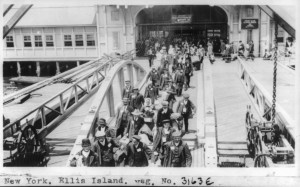 Image source: http://www.irishtimes.com/blogs/generationemigration/2011/11/02/traditions-of-emigration-the-irish-habit-of-going-away/irish-immigrants-ellis-island/
Image source: http://www.irishtimes.com/blogs/generationemigration/2011/11/02/traditions-of-emigration-the-irish-habit-of-going-away/irish-immigrants-ellis-island/
It is difficult to imagine leaving everything you have ever known behind. Yet millions of our ancestors did just that in search of a better life for themselves and their families. Many were stricken by poverty, famine, and disease, and were forced to leave their homelands behind in search of better opportunities. Already in dire circumstances, they endured long journeys and were faced with many challenges upon their arrival.
To assist these immigrants, many benevolent and aid societies were created. They offered resources to the newly arrived, and helped many establish themselves in the United States.
Similarly, immigrant guides were also produced and circulated during this time period. These very practical guides offered advice before and after immigration, and sought to provide tips and useful knowledge. They informed the immigrant about what to do upon arrival in America, who to avoid, and how to adjust to their new life.
One of the more interesting guides that I have discovered was written for Danish immigrants. In 1911, Holger Rosenberg compiled a list of one hundred tips entitled 100 nyttige Raad for Udvandrere samt en Vejleder i alle Forhold vedrørende Udvandring til de Forenede Stater, tilligemed Ordbog, Taleøvelser, Kort, etc. Translated by the Museum of Danish America, this guide sought to provide Danish immigrants with advice for every step of their journey.
Some interesting tips include:
- If you have decided to emigrate, don’t wait a minute before learning a little English. (# 1)
- Put your best foot forward when you land. (# 21)
- No place in the U.S. is as difficult to find work in as New York; in no place is it so easy to flounder. Don’t stop here! (# 28)
- Make sure you are on the right train at the right time and in the right seat. In the U.S., no one will be watching out for you. (# 39)
- Don’t worry about your baggage. Once it has been tagged, it will come to your precise destination. (# 41)
- It is stupid elsewhere in the world, but it is even more stupid in America to tell just anyone you meet and who calls you a friend just how much money you have. (# 49)
- Even if you find an American street to be a hellaciously noisy place, don’t lose your head. Take it easy, and learn to protect your nerves. (# 60)
- Never fear, try again. (# 74)
- Travel home to old Denmark when you have increased your knowledge and bank account, and let all of this be useful to your motherland. Another young person can then travel across the Atlantic in your place. (# 100)
Though some of these tips seem like common sense to you and me, one purpose of this guide was to reinforce the fact that you were no longer surrounded by family, friends, and neighbors. America could be a dangerous place, and you could very easily be taken advantage of. These guides also encouraged individuals to strike a balance between their old life and their new life, something which was undoubtedly difficult to achieve.
On top of learning a new language and adjusting to new social customs, they had to navigate their way through busy cities, boarding houses, and transportation systems. Examining these guides can offer a little insight into the many challenges that our ancestors faced upon arrival in America, and remind us just how difficult their experience must have been.
Out of all of these tips, I found tip #41 particularly amusing – “Don’t worry about your baggage. Once it has been tagged, it will come to your precise destination.” I’ll believe it when I see it!
Share this:
About Sheilagh Doerfler
Sheilagh, a native of Chelmsford, Massachusetts, received her B.A. in History and Communication from the University of Massachusetts-Amherst. Her research interests include New England, Norway, Sweden, Ireland, Westward Migration, and adoptions.View all posts by Sheilagh Doerfler →